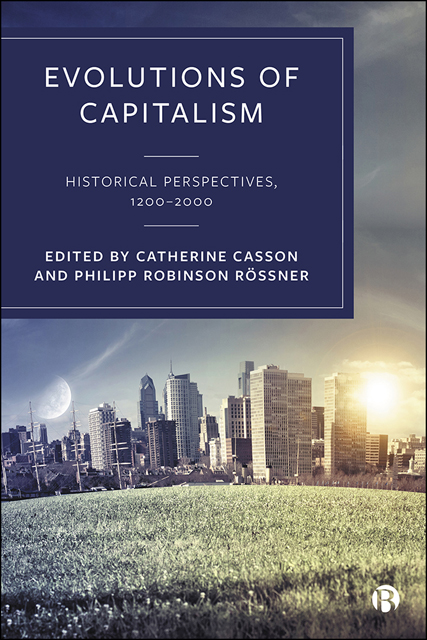Book contents
- Frontmatter
- Contents
- List of Figures and Tables
- Notes on Contributors
- Acknowledgements
- 1 Introduction
- 2 The Market as an Institution: Theory and History
- 3 Regulating Capitalism
- 4 Capitalism and State Ownership Models
- 5 Comparative and Connected Global Capitalism(s)
- 6 Capitalism, Imperialism and the Emergence of an Industrialized Global Economy
- 7 Religion and Capitalism
- 8 Capitalism and the Environment
- 9 Capitalism and Income Inequality
- 10 Conclusion
- Index
9 - Capitalism and Income Inequality
Published online by Cambridge University Press: 13 October 2022
- Frontmatter
- Contents
- List of Figures and Tables
- Notes on Contributors
- Acknowledgements
- 1 Introduction
- 2 The Market as an Institution: Theory and History
- 3 Regulating Capitalism
- 4 Capitalism and State Ownership Models
- 5 Comparative and Connected Global Capitalism(s)
- 6 Capitalism, Imperialism and the Emergence of an Industrialized Global Economy
- 7 Religion and Capitalism
- 8 Capitalism and the Environment
- 9 Capitalism and Income Inequality
- 10 Conclusion
- Index
Summary
Introduction
The extent to which capitalism has increased or decreased inequality has generated significant debate from the 18th century onwards. The capitalist system allows people to derive income and wealth from assets that they own. The most valuable assets are those that are scarce. For 18th-and early 19th-century classical economists such as Smith and Mill good quality agricultural land was the scarce asset and therefore the most important source of income and wealth (Smith, 1791; Mill, 1848). However, from the mid-19th century onwards, in the light of the Industrial Revolution, Marx and neoclassical economists emphasized the importance of capital with which to purchase machinery and factory buildings, and finance inventory (Marx, 1961). Gradually skills possessed by the individual moved to the fore. The second Industrial Revolution in the US emphasized the desirability of skill in organizing large businesses and trusts and in foretelling the future through speculation (Hayek, 1949; Kirzner, 1973). Scarcity factors have become more intangible over time. From the 1930s onwards ‘knowledge’ as possessed by professional managers and scientist became a value asset (Harper, 1995). Finally, from the 1970s onwards, entrepreneurship began to be recognized as a scarce factor.
The change in emphasis on scarce assets had the potential to remove the inequality that had existed whereby income and wealth were concentrated in the hands of large landowners. Land was passed on through inheritance, meaning that subsequent generations started in an advantageous position as they did not have to allocate time and money to acquire assets from scratch and the acquisition was not dependent on their personal performance (for example their skill as a cultivator). Skills-based assets, in contrast, were based to a greater extent on merit. This had implications for social mobility. The acquisition of land acquired significant amounts of capital and it was hard for an outsider to break into the landowning elite. The acquisition of skills required less up-front capital. However, background could still provide a competitive advantage, as a good education enhanced the skills based. Opportunities for social mobility were more difficult for children, whose education was curtailed because they had to enter the workplace at a young age.
- Type
- Chapter
- Information
- Evolutions of CapitalismHistorical Perspectives, 1200-2000, pp. 212 - 236Publisher: Bristol University PressPrint publication year: 2022



